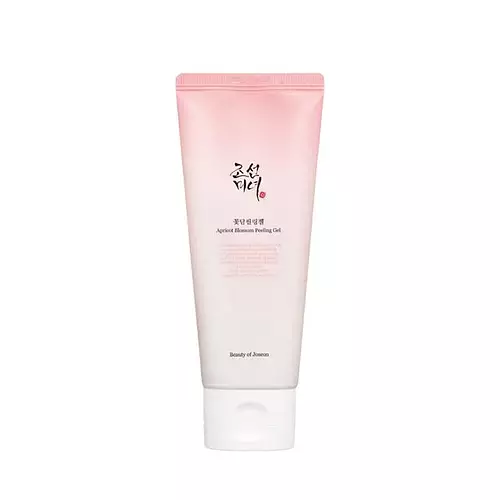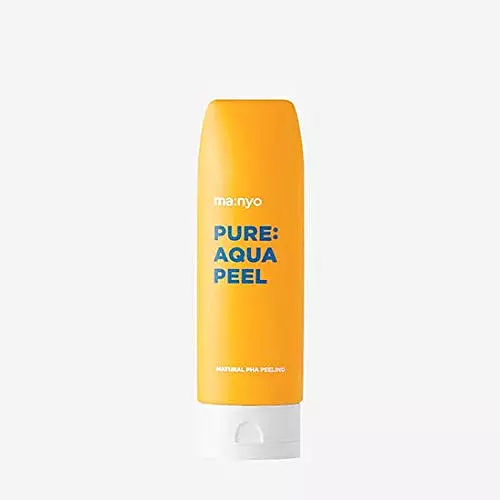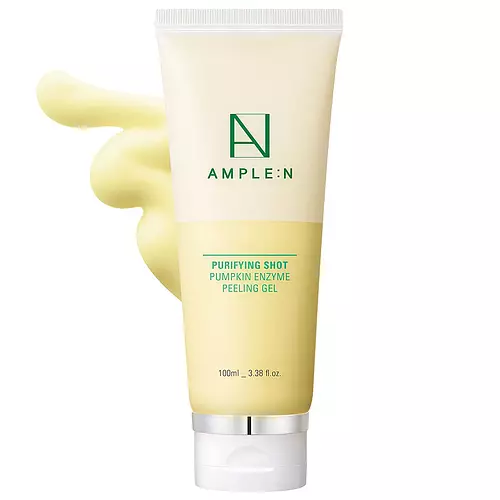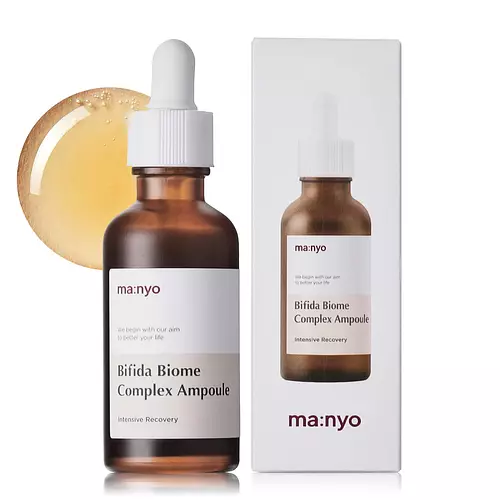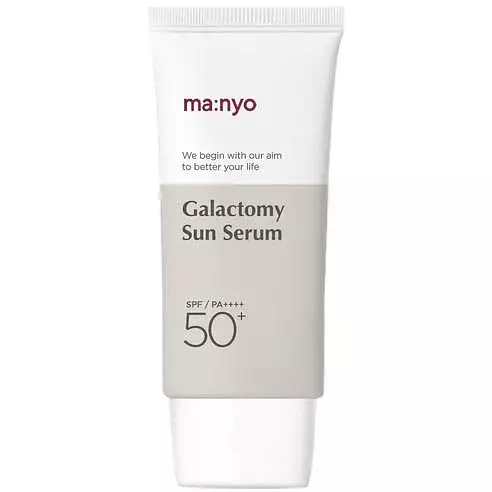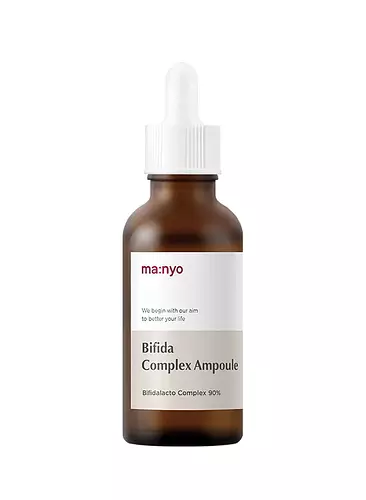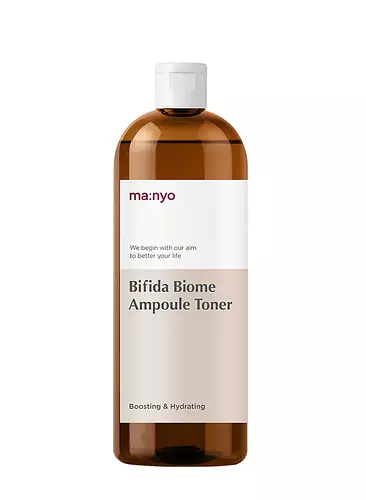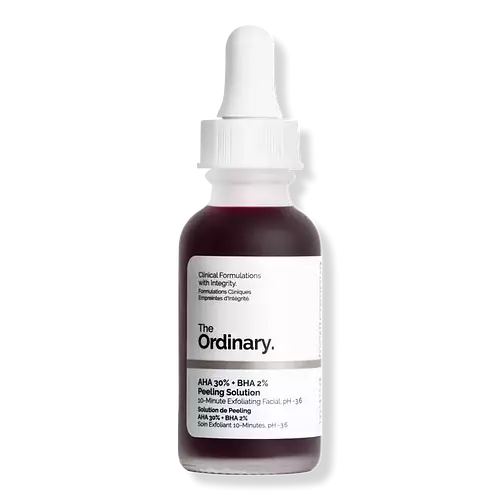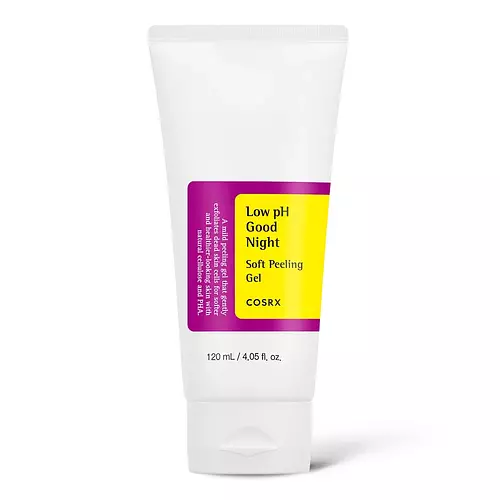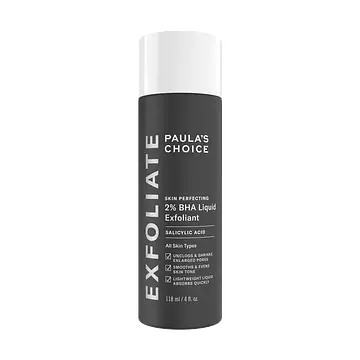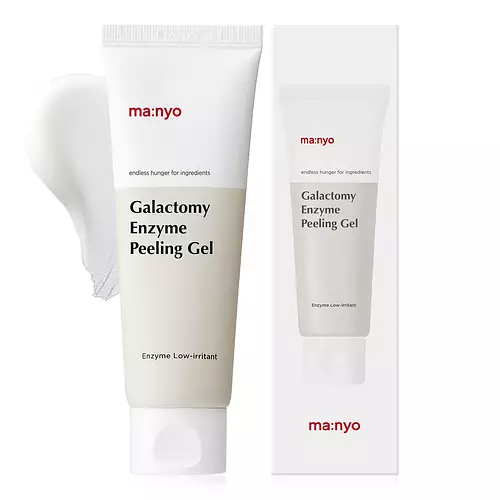
ma:nyo Galactomy Enzyme Peeling Gel Ingredients Explained
Overview
What it is
Exfoliator with 59 ingredients that contains ceramides, hyaluronic acid, niacinamide and peptides
Cool Features
It is vegan, cruelty-free, and reef safe
Suited For
It has ingredients that are good for fighting acne, anti aging, dry skin, brightening skin, sensitive skin, oily skin, reducing pores, scar healing and dark spots
Free From
It doesn't contain any harsh alcohols, parabens, silicones or sulfates
Fun facts
ma:nyo is from South Korea. This product is used in 5 routines created by our community.
We independently verify ingredients and our claims are backed by peer-reviewed research. Does this product need an update? Let us know.
Exfoliator with 59 ingredients that contains ceramides, hyaluronic acid, niacinamide and peptides
Quick info
You should know
Notable Ingredients
This product contains 1 ingredient that may have this attribute:
This product contains 1 ingredient that may have this attribute:
This product contains 1 ingredient that may have this attribute:
This product contains 4 ingredients that may have this attribute:
Benefits
This product contains 5 ingredients that may have this attribute:
This product contains 2 ingredients that may have this attribute:
This product contains 8 ingredients that may have this attribute:
This product contains 6 ingredients that may have this attribute:
This product contains 2 ingredients that may have this attribute:
This product contains 1 ingredient that may have this attribute:
This product contains 1 ingredient that may have this attribute:
This product contains 1 ingredient that may have this attribute:
This product contains 2 ingredients that may have this attribute:
This product contains 2 ingredients that may have this attribute:
Concerns
This product contains 1 ingredient that may have this attribute:
This product contains 1 ingredient that may have this attribute:
This product contains 1 ingredient that may have this attribute:
Ingredients 59
Galactomyces Ferment Filtrate (GFF) is a yeast traditionally used to make the Japanese alcoholic beverage, sake.
Hydrolyzed Collagen Extract can help to reduce the effects of aging.
Squalane is an emollient that helps the skin hold onto moisture. It's an oily liquid that occurs naturally in certain types of fish and plant oils.
Cetearyl alcohol is a mixture of two fatty alcohols: cetyl alcohol and stearyl alcohol. It is mainly used as an emulsifier. Emulsifiers help prevent the separation of oils and products. Due to its composition, it can also be used to thicken a product or help create foam.
Glycerin is already naturally found in your skin. It helps moisturize and protect your skin.
Caprylic/Capric Triglyceride is an emollient, solvent, and texture enhancer. It is considered a skin-softener by helping the skin prevent moisture loss.
Propanediol helps absorb ingredients into your skin, boosting their benefits. It can act as an emollient, making your skin softer. Propanediol can help products last longer by boosting the properties of preservatives within the formulation.
1,2-Hexanediol is a multi-tasker ingredient. It acts as a preservative to increase shelf-life and can aid other preservatives in preventing microbe growth. 1,2-Hexanediol also helps the skin retain moisture as a humectant.
Niacinamide has emerged as an all-star ingredient due to its many benefits.
Hamamelis Virginiana Water is made used distilled parts of the witch hazel plant. The witch hazel plant is native to eastern North America.
Oryza Sativa Bran Water comes from the outer layer of a rice kernel. It is a byproduct of milling rice, or the operation to produce a whole grain rice product.
Polyglyceryl-6 Stearate isn't fungal acne safe.
Panthenol (also referred to as pro-vitamin B5) is a common ingredient that helps hydrate and soothe the skin.
Centella Asiatica Extract (Cica) is derived from an herb native to Southeast Asia. It is famous for its anti-inflammatory and soothing properties.
Glycyrrhiza Uralensis Root Extract comes from Chinese licorice. This plant is native to Asia and used in Chinese traditional medicine. Chinese licorice root contains antioxidants and polysaccharides.
Saccharomyces Ferment Filtrate is created from fermenting Saccharomyces, a yeast also known as baker's yeast or brewer's yeast.
Dioscorea Japonica Root Extract comes from the Asian Mountain Yam. It contains antioxidant and anti-inflammatory properties.
Salix Alba Bark Extract comes from the white willow tree, which is native to Europe and Central Asia.
This ingredient is the fixed oil extracted from seeds of the desert shrub Jojoba. It is more commonly known as jojoba oil. The seed oil is liquid wax ester from the plant. It is non-comedogenic.
Betaine is a common humectant (a substance that promotes retention of moisture). It's known to be gentle on the skin and can help balance hydration.
Centella Asiatica Leaf Extract comes from the leaves of an herb plant native to Southeast Asia. Centella Asiatica is rich in antioxidants and amino acids. It can help reduce irritation and soothe the skin.
Mangifera Indica Seed Butter isn't fungal acne safe.
Polyglyceryl-2 Stearate isn't fungal acne safe.
Glyceryl Stearate is a mix of glycerin and stearic acid.
Stearyl Alcohol is a type of fatty alcohol from stearic acid. It is a white, waxy compound used to emulsify ingredients.
Laminaria Japonica Extract comes from a kelp more commonly known as 'sweet kelp'. It is commonly eaten in Japan, Korea, and China.
Rosmarinus Officinalis Leaf Extract comes from rosemary. Rosemary is native to the Mediterranean.
Chamomilla Recutita Flower Extract comes from the Chamomile flower.
Camellia Sinensis Leaf Extract is derived from the leaves of the tea plant. Black tea, green tea, and oolong tea are all harvested from this plant.
sh-Oligopeptide-1 is a peptide found naturally in our bodies. The manufacturer states it is a bioengineered to be identical to a human gene that codes for epidermal growth factor (EGF). EGF are signal molecules that simulate cell growth and healing.
Peptides are amino acids naturally found in your skin. These amino acids make up many proteins your skin uses. Collagen is made up of peptides. Collagen is responsible for keeping your skin plump and youthful.
Sodium Hyaluronate is hyaluronic acid's salt form. It is commonly derived from the sodium salt of hyaluronic acid.
Polygonum Cuspidatum Root Extract comes from the Japanese Knotweed plant native to Japan, Korea, and China.
Scutellaria Baicalensis Root Extract comes from the Baikal skullcap or Chinese skullcap plant. This plant is native to Northeast Asia and can be found in China, Mongolia, Korea, and Siberia.
Ethylhexylglycerin (we can't pronounce this either) is commonly used as a preservative and skin softener. It is derived from glyceryl.
Beta-Glucan is a polysaccharide. It can be derived from the cell walls of seaweed, oats, yeast, and fungi.
Hydrogenated Olive Oil Unsaponifiables is an oil and isn't fungal acne safe.
Glutathione is an antioxidant naturally found in our bodies. It is made up of three amino acids: glycine, cysteine, and glutamic acid.
Maltodextrin is a polysaccharide. It is derived from starch such as rice, corn, wheat, or potato starch.
Trehalose is a disaccharide made of two glucose molecules (glucose is sugar!). Trehalose is used to help moisturize skin. It also has antioxidant properties.
Glyceryl Caprylate comes from glycerin and caprylic acid, a fatty acid from coconut.
Rosa Damascena Flower Oil is an essential oil made from the Damask Rose. It is often used as a fragrance in cosmetics.
Adenosine is in every living organism. It is one of four components in nucleic acids that helps store our DNA.
Galactomyces Ferment Filtrate 24.8%, Hydrolyzed Collagen Extract, Squalane, Cetearyl Alcohol, Glycerin, Caprylic/Capric Triglyceride, Propanediol, 1,2-Hexanediol, Niacinamide, Phaseolus Radiatus Seed Water, Hamamelis Virginiana Water, Oryza Sativa Bran Water, Rosa Centifolia Flower Water, Polyglyceryl-6 Stearate, Panthenol, Centella Asiatica Extract, Glycyrrhiza Uralensis Root Extract, Saccharomyces Ferment Filtrate, Dioscorea Japonica Root Extract, Salix Alba Bark Extract, Simmondsia Chinensis Seed Oil, Betaine, Centella Asiatica Leaf Extract, Mangifera Indica Seed Butter, Polyglyceryl-2 Stearate, Glyceryl Stearate, Stearyl Alcohol, Laminaria Japonica Extract, Cassia Italica Leaf Extract, Rosmarinus Officinalis Leaf Extract, Chamomilla Recutita Flower Extract, Camellia Sinensis Leaf Extract, Sh-Oligopeptide-1, Sh-Oligopeptide-2, Sh-Polypeptide-1, Sh-Polypeptide-2, Sodium Hyaluronate, Polygonum Cuspidatum Root Extract, Scutellaria Baicalensis Root Extract, Ethylhexylglycerin, Macadamia Integrifolia Seed Oil, Propanediol Dicaprylate, Beta-Glucan, Hydrogenated Olive Oil Unsaponifiables, Enantia Chlorantha Bark Extract, Oleanolic Acid, Polyglyceryl-6 Behenate, Acanthopanax Senticosus Root Extract, Glutathione, Maltodextrin, Hydrolyzed Avocado Protein, Trehalose, Glyceryl Caprylate, Ceramide NP, Carnosine, Viscum Album Extract, Rosa Damascena Flower Oil, Rose Flower Oil, Adenosine
Ingredient Ratings
Based on the number of likes and dislikes each ingredient has received.
Ingredients Explained
Galactomyces Ferment Filtrate (GFF) is a yeast traditionally used to make the Japanese alcoholic beverage, sake.
GFF has moisturizing and antioxidant properties.
Studies show GFF improves our skin's natural moisturizing factors (NMF). Our NMF consists of many components that naturally moisturize our skin. Having healthy NMF keeps our skin plump, protected, and hydrated.
This ingredient tells our skin to create more filaggrin, an important component for NMF.
Filaggrin gathers all the structural proteins in our outer layer of skin and creates a tight barrier, helping to protect our skin against allergens and bacteria. This also helps prevent moisture loss.
Thanks to its antioxidant properties, GFF also protects our skin against oxidative stress and UV induced inflammation.
One study found GFF helped regulate sebum (oil) production and keratin in participants.
GFF may not be fungal-acne safe. We recommend speaking with a professional if you have concerns.
Many components of sake, such as GFF, are studied for their anti-aging benefits today. This is because sake brewers are known to have youthful hands.
Learn more about Galactomyces Ferment FiltrateHydrolyzed Collagen Extract can help to reduce the effects of aging.
Squalane is an emollient that helps the skin hold onto moisture. It's an oily liquid that occurs naturally in certain types of fish and plant oils.
Because squalane boosts hydration in the skin, it also comes with plenty of benefits: it is an antioxidant and can help fight free radicals and skin damage. Squalane is also found to have a detoxifying effect when applied.
Squalane comes from squalene, which occurs naturally within the sebum of our skin. It is one of the oils our skin produces to keep itself hydrated. Squalane is the hydrogenated version of squalene and has a longer shelf life.
Research shows that squalane is non-irritating (even at 100% concentration).
In general, it's a fantastic ingredient. It does a great job at hydrating the skin, and it's suitable for those with sensitive skin.
The source of squalane may impact malassezia / fungal acne. This is because olive oil derived squalane can contain impurities such as fatty acids and plant waxes. Sugarcane derived squalane is recommended for anyone with malassezia concerns.
Is squalane vegan?
This depends on the source. Squalane can be derived from both plants and animals. Most squalane used in skincare comes from plants.
Please note: the source of squalane is only known if disclosed by the brand. We recommend reaching out to the brand if you have any questions about their squalane.
Read more about squalene with an "e".
Learn more about SqualaneCetearyl alcohol is a mixture of two fatty alcohols: cetyl alcohol and stearyl alcohol. It is mainly used as an emulsifier. Emulsifiers help prevent the separation of oils and products. Due to its composition, it can also be used to thicken a product or help create foam.
Cetearyl alcohol is an emollient. Emollients help soothe and hydrate the skin by trapping moisture.
Studies show Cetearyl alcohol is non-toxic and non-irritating. The FDA allows products labeled "alcohol-free" to have fatty alcohols.
This ingredient is usually derived from plant oils such as palm, vegetable, or coconut oils. There is debate on whether this ingredient will cause acne.
Due to the fatty acid base, this ingredient may not be Malassezia folliculitis safe.
Learn more about Cetearyl AlcoholGlycerin is already naturally found in your skin. It helps moisturize and protect your skin.
A study from 2016 found glycerin to be more effective as a humectant than AHAs and hyaluronic acid.
As a humectant, it helps the skin stay hydrated by pulling moisture to your skin. The low molecular weight of glycerin allows it to pull moisture into the deeper layers of your skin.
Hydrated skin improves your skin barrier; Your skin barrier helps protect against irritants and bacteria.
Glycerin has also been found to have antimicrobial and antiviral properties. Due to these properties, glycerin is often used in wound and burn treatments.
In cosmetics, glycerin is usually derived from plants such as soybean or palm. However, it can also be sourced from animals, such as tallow or animal fat.
This ingredient is organic, colorless, odorless, and non-toxic.
Glycerin is the name for this ingredient in American English. British English uses Glycerol/Glycerine.
Learn more about GlycerinCaprylic/Capric Triglyceride is an emollient, solvent, and texture enhancer. It is considered a skin-softener by helping the skin prevent moisture loss.
Within a product, Caprylic Triglyceride can thicken the product and make spreadability easier by dissolving clumping compounds. An added benefit of Caprylic Triglyceride is its antioxidant properties.
Caprylic Triglyceride is made by combining glycerin with coconut oil, forming a clear liquid. Caprylic Triglyceride has not been found to be toxic for human use in concentrations under 50%.
While there is an assumption Caprylic Triglyceride can clog pores due to it being derived from coconut oil, there is no research supporting this.
Learn more about Caprylic/Capric TriglyceridePropanediol helps absorb ingredients into your skin, boosting their benefits. It can act as an emollient, making your skin softer. Propanediol can help products last longer by boosting the properties of preservatives within the formulation.
Propanediol is not likely to cause sensitivity and considered safe to use.
It is derived from corn or petroleum with a clear color and no scent.
Learn more about Propanediol1,2-Hexanediol is a multi-tasker ingredient. It acts as a preservative to increase shelf-life and can aid other preservatives in preventing microbe growth. 1,2-Hexanediol also helps the skin retain moisture as a humectant.
In products that are water-based, this ingredient can help stabilize perfumes and fragrances. It can also help make the texture of products softer and more smooth.
Niacinamide has emerged as an all-star ingredient due to its many benefits.
It is known to treat acne by reducing inflammation. It also helps fade dark-spots and strengthen the skin by promoting the growth of the ceramide barrier.
Other benefits include smoothing wrinkles and minimizing redness.
The cherry on top? Niacinamide can also help build keratin, a protein that keeps skin firm.
When incorporating niacinamide into your routine, look out for concentration amounts. Typically, 5% niacinamide provides benefits such as fading dark spots. However, if you have sensitive skin, it is better to begin with a smaller concentration.
Niacinamide can be mixed with other ingredients to boost benefits. For instance, it has shown to be effective when used with copper, folic acid, and zinc to treat acne.
Learn more about NiacinamidePhaseolus Radiatus Seed Water is created by distilling mung beans.
Mung beans are an edible legume from Asia. It is commonly used in Asian desserts.
Hamamelis Virginiana Water is made used distilled parts of the witch hazel plant. The witch hazel plant is native to eastern North America.
The name 'Hamamelis Virginiana Water' refers to the distillation while the name 'Witch Hazel' is used when it is an active drug ingredient. Unless it is specified to be non-alcohol, many types of witch hazel are distilled in denatured alcohol.
Witch Hazel water is an astringent, anti-inflammatory, antioxidant, and antibacterial ingredient. The tannin in witch hazel has a drying effect when used on skin and constricts proteins. This helps minimize the look of large pores. The tannins present and the fragrance may be sensitizing. The catechins in witch hazel have anti-inflammatory properties while the gallic acid is antibacterial.
Indigenous groups have used witch hazel to help treat inflammation, which was then used by early settlers to North America.
Learn more about Hamamelis Virginiana WaterOryza Sativa Bran Water comes from the outer layer of a rice kernel. It is a byproduct of milling rice, or the operation to produce a whole grain rice product.
Oryza Sativa Bran Water is used for masking and perfuming.
Masking ingredients are used to obscure or block properties of other ingredients. They are commonly used to block the scent of a product.
Peruming ingredients help give products a scent or cover another scent. Perfuming ingredients can be natural or synthetically created.
Learn more about Oryza Sativa Bran WaterWe don't have a description for Rosa Centifolia Flower Water.
Polyglyceryl-6 Stearate isn't fungal acne safe.
Panthenol (also referred to as pro-vitamin B5) is a common ingredient that helps hydrate and soothe the skin.
lt is a humectant, meaning that it helps the skin attract and retain moisture.
Another benefit is the anti-inflammatory abilities. This means that it's great for sensitive, irritation-prone skin.
Once oxidized, panthenol converts to pantothenic acid. Panthothenic acid is found in all living cells.
Learn more about PanthenolCentella Asiatica Extract (Cica) is derived from an herb native to Southeast Asia. It is famous for its anti-inflammatory and soothing properties.
Cica is rich in antioxidants and amino acids, such as Madecassic Acid and Asiaticoside.
Studies show the compounds in cica help with:
The combination of all these properties makes cica effective at soothing, hydrating, and protecting the skin.
Other great components of Cica include Vitamin A, vitamin C, several B vitamins, and Asiatic Acid.
Fun fact: Cica has been used as a medicine and in food for many centuries. As a medicine, it is used to treat burns, scratches, and wounds.
Learn more about Centella Asiatica ExtractGlycyrrhiza Uralensis Root Extract comes from Chinese licorice. This plant is native to Asia and used in Chinese traditional medicine. Chinese licorice root contains antioxidants and polysaccharides.
Antioxidants may help with anti-aging by neutralizing free-radical molecules. Polysaccharides help moisturize the skin due to their ability to mimic our natural skin barrier.
Saccharomyces Ferment Filtrate is created from fermenting Saccharomyces, a yeast also known as baker's yeast or brewer's yeast.
As a humectant, Saccharomyces Ferment Filtrate helps draw moisture from the air to your skin. This helps keep your skin hydrated. This is due to its beta-glucan content.
Dioscorea Japonica Root Extract comes from the Asian Mountain Yam. It contains antioxidant and anti-inflammatory properties.
Antioxidants help neutralize free-radical molecules. These molecules may damage your skin cells and DNA.
Salix Alba Bark Extract comes from the white willow tree, which is native to Europe and Central Asia.
Salix Alba Bark Extract has often been described as salicylic acid's cousin. This is due to the salicin it contains. However, studies are limited showing salix alba bark to be an effective salicylic acid alternative.
Salicin does have anti-inflammatory and antioxidant properties. It has shown to decrease the formation of inflammatory mediators, such as tumor necrosis factor-α and nuclear factor-kappa B. Salicin also has a mildly exfoliating effect on the skin.
Several other components in salix alba bark extract also contain antioxidant properties, such as flavonoids and polyphenols. Antioxidants may help with anti-aging as they neutralize harmful free-radical molecules.
Willow Bark extract has been used for thousands of years. Ancient civilizations used white willow to help treat pain and fevers.
Learn more about Salix Alba Bark ExtractThis ingredient is the fixed oil extracted from seeds of the desert shrub Jojoba. It is more commonly known as jojoba oil. The seed oil is liquid wax ester from the plant. It is non-comedogenic.
Jojoba oil does not contain fragrance and has many fatty-acids, making it a great soothing ingredient. Jojoba contains Vitamin E, a great moisturizing ingredient. Vitamin E is also an antioxidant. Antioxidants help protect your skin against free-radical damage. This may help in anti-aging.
Jojoba seed oil is a humectant, meaning it helps draw moisture from the air. This helps keep your skin hydrated.
While jojoba has antibacterial properties, it is only able to kill some bacteria. It has also been shown to help in wound healing. Indigenous cultures have used jojoba as a moisturizer and to help treat burns.
It is found to be similar to natural human skin sebum, so it has a great effect on dry skin. Jojoba oil may even help with regulating sebum production.
Although jojoba oil is non-comedogenic, we recommend speaking with a professional about using this ingredient if you have any concerns.
Jojoba oil may not be fungal acne safe. We recommend speaking with a professional if you have any concerns.
Jojoba is native to the southwestern US.
Learn more about Simmondsia Chinensis Seed OilBetaine is a common humectant (a substance that promotes retention of moisture). It's known to be gentle on the skin and can help balance hydration.
Betaine is best for improving hydration and soothing irritated skin. Studies show betaine may help with uneven skin tones.
Betaine is naturally created in the skin and body. The form found within cosmetic products can be either plant-dervied or synthetic.
Learn more about BetaineCentella Asiatica Leaf Extract comes from the leaves of an herb plant native to Southeast Asia. Centella Asiatica is rich in antioxidants and amino acids. It can help reduce irritation and soothe the skin.
Many active components found in centella asiatica, such as Madecassic Acid and Asiaticoside, encourage the skin to naturally produce hyaluronic acid. This helps keep our skin hydrated. Many of these components also show antioxidant activity and may help reduce the signs of aging.
Research shows centella asiatica can help increase Type I collagen production by increasing fibroblast production. Fibroblast helps form connective tissue.
The combination of all these properties makes centella asiatica leaf extract effective at soothing the skin.
Other components of centella asiatica leaf extract include Vitamin A, vitamin C, several B vitamins, and Asiatic Acid.
Recent studies found madecassoside may help prevent damage from UV rays by preventing UV-induced inflammation. Further research is needed.
This plant has been used as a medicine and in food for many centuries. As a medicine, it is used to treat burns, scratches, and wounds.
Learn more about Centella Asiatica Leaf ExtractMangifera Indica Seed Butter isn't fungal acne safe.
Polyglyceryl-2 Stearate isn't fungal acne safe.
Glyceryl Stearate is a mix of glycerin and stearic acid.
Glyceryl Stearate is used to stabilize the mixing of water and oil ingredients. By preventing these ingredients from separating, it can help elongate shelf life. It can also help thicken the product's texture.
As an emollient, it helps soften skin and supports barrier-replenishing ingredients.
In cosmetics, Glyceryl Stearate is often made from vegetable oils or synthetically produced. The human body also creates Glyceryl Stearate naturally.
Learn more about Glyceryl StearateStearyl Alcohol is a type of fatty alcohol from stearic acid. It is a white, waxy compound used to emulsify ingredients.
Fatty Alcohols are most often used as an emollient or to thicken a product. Emollients help soothe and hydrate the skin by trapping moisture.
They are usually derived from natural fats and oils and therefore do not have the same drying or irritating effect as solvent alcohols. FDA allows products labeled "alcohol-free" to have fatty alcohols.
Learn more about Stearyl AlcoholLaminaria Japonica Extract comes from a kelp more commonly known as 'sweet kelp'. It is commonly eaten in Japan, Korea, and China.
Sweet kelp is a humectant and helps hydrate your skin. Humectants draw moisture from the air to your skin.
Studies show Laminaria Japonica has antioxidant compounds. Antioxidants may help with anti-aging. Kelp also contains magnesium and zinc, making it great for calming inflammation and redness.
Learn more about Laminaria Japonica ExtractWe don't have a description for Cassia Italica Leaf Extract.
Rosmarinus Officinalis Leaf Extract comes from rosemary. Rosemary is native to the Mediterranean.
While Rosmarinus Officinalis Leaf Oil can be volatile due to its fragrant properties, this component is usually removed in the leaf extract.
Rosemary Leaf Extract can help protect your skin against damage from free-radical molecules. It contains many antioxidants such as rosmarinic acid and caffeic acid. Rosemarinic acid has been found to help soothe skin conditions such as eczema and acne.
Learn more about Rosmarinus Officinalis Leaf ExtractChamomilla Recutita Flower Extract comes from the Chamomile flower.
Chamomile is rich in antioxidants and has anti-inflammatory properties. Several compounds found in chamomile help with soothing, such as bisbolol.
Antioxidant components in chamomile make it an effective ingredient to help slow the signs of aging. Antioxidants help fight free-radical molecules, or molecules that may damage your skin.
Essential oils from chamomile have been found to improve wound healing due to its antimicrobial properties.
Ancient Greeks and Egyptians used Chamomile to treat skin redness and dryness. Chamomile has also been used to help treat stomach issues.
Learn more about Chamomilla Recutita Flower ExtractCamellia Sinensis Leaf Extract is derived from the leaves of the tea plant. Black tea, green tea, and oolong tea are all harvested from this plant.
Camellia Sinensis Leaf Extract has many benefits. It contains polyphenols, a strong antioxidant. Antioxidants help fight off free-radical molecules that damage skin cells. The antioxidants in green tea neutralize free-radicals from the sun. This gives the skin some extra UV protection, but should not replace sunscreen.
Many components of tea have anti-inflammatory properties. Polyphenols and L-theanine help soothe the skin and reduce irritation. L-theanine is an amino acid that makes up most of the amino acids found in tea leaves. The caffeine in Camellia Sinensis Leaf Extract helps calm inflamed blood vessels.
Camellia Sinensis Leaf Extract also contains Vitamin Bs, linoleic acid, magnesium, calcium, iron, and zinc.
Camellia Sinensis Leaf Extract also has antimicrobial properties.
Research has shown both drinking Camellia Sinensis Leaf Tea and applying it to the skin can help boost skin elasticity and hydration. Studies also show using tea extract may reduce sebum, or oil, production.
Learn more about Camellia Sinensis Leaf Extractsh-Oligopeptide-1 is a peptide found naturally in our bodies. The manufacturer states it is a bioengineered to be identical to a human gene that codes for epidermal growth factor (EGF). EGF are signal molecules that simulate cell growth and healing.
Generally, peptides are the building blocks for collagen and elastin in our skin.
In South Korea and China, EGF is considered a controversial ingredient. The South Korean Ministry of Food and Drug Safety has cracked down on companies with products including EGF due to false advertisement.
Learn more about Sh-Oligopeptide-1Sh-Oligopeptide-2 is a peptide.
Peptides are amino acids naturally found in your skin. These amino acids make up many proteins your skin uses. Collagen is made up of peptides. Collagen is responsible for keeping your skin plump and youthful.
As you age, your body naturally produces less collagen. Since peptides are the building blocks of collagen, it may have anti-aging effects.
Sh-Polypeptide-2 is a peptide.
Sodium Hyaluronate is hyaluronic acid's salt form. It is commonly derived from the sodium salt of hyaluronic acid.
Like hyaluronic acid, it is great at holding water and acts as a humectant. This makes it a great skin hydrating ingredient.
Sodium Hyaluronate is naturally occurring in our bodies and is mostly found in eye fluid and joints.
These are some other common types of Hyaluronic Acid:
Learn more about Sodium HyaluronatePolygonum Cuspidatum Root Extract comes from the Japanese Knotweed plant native to Japan, Korea, and China.
This plant contains anti-inflammatory and antioxidant properties. It contains high amounts of resveratrol, a potent antioxidant.
The root of the plant has been used in traditional folk medicine throughout Asia.
Learn more about Polygonum Cuspidatum Root ExtractScutellaria Baicalensis Root Extract comes from the Baikal skullcap or Chinese skullcap plant. This plant is native to Northeast Asia and can be found in China, Mongolia, Korea, and Siberia.
In cosmetics, Scutellaria Baicalensis Root Extract provides antioxidant and anti-inflammatory benefits. This is due to the flavonoid composition of Scutellaria Baicalensis Root Extract.
In Chinese traditional folk medicine, Scutellaria Baicalensis Root Extract is used to help treat lung and hypertension.
Learn more about Scutellaria Baicalensis Root ExtractEthylhexylglycerin (we can't pronounce this either) is commonly used as a preservative and skin softener. It is derived from glyceryl.
You might see Ethylhexylglycerin often paired with other preservatives such as phenoxyethanol. Ethylhexylglycerin has been found to increase the effectiveness of these other preservatives.
Macadamia Seed oil is an emollient. It is rich in fatty acids: oleic, linoleic, and palmitoleic.
An an emollient, macadamia seed oil helps hydrate the skin by creating a thin film on top. This film prevents moisture from evaporating.
Due to the fatty acid content of this ingredient, it may not be Malassezia folliculitis safe.
Learn more about Macadamia Integrifolia Seed OilWe don't have a description for Propanediol Dicaprylate.
Beta-Glucan is a polysaccharide. It can be derived from the cell walls of seaweed, oats, yeast, and fungi.
Beta-Glucan is a humectant, meaning it can hold large amounts of water. This helps hydrate the skin. It also helps boost your skin's natural barrier.
Beta-Glucan has antioxidant properties. Antioxidants help fight free-radicals. Free-radicals are molecules that may damage your skin cells, such as pollution.
Studies show Beta-Glucan may be an effective wrinkle reducer as it can deeply penetrate into skin. It has also been show to help with wound healing.
Learn more about Beta-GlucanHydrogenated Olive Oil Unsaponifiables is an oil and isn't fungal acne safe.
We don't have a description for Enantia Chlorantha Bark Extract.
We don't have a description for Oleanolic Acid.
Polyglyceryl-6 Behenate isn't fungal acne safe.
We don't have a description for Acanthopanax Senticosus Root Extract.
Glutathione is an antioxidant naturally found in our bodies. It is made up of three amino acids: glycine, cysteine, and glutamic acid.
As an antioxidant, it prevents oxidative damage to parts of our cell.
While glutathione is said to help with skin lightening, the results from research are inconclusive. Further studies are needed.
However, gluthatione has been shown to protect our skin from UV-B induced damage.
This ingredient is naturally occurring in plants, animals, fungi, and some bacteria.
Learn more about GlutathioneMaltodextrin is a polysaccharide. It is derived from starch such as rice, corn, wheat, or potato starch.
In food, Maltodextrin is used to improve the texture and thicken a product. Due to its structure, it can help create a gel texture. As an emulsion stabilizer, it helps keep the ingredients in a product together.
As a polysaccharide, Maltodextrin has moisturizing properties. Polysaccharides are a type of carbohydrate. The top layer of skin uses polysaccharides to retain water, keeping the skin hydrated.
Maltodextrin is water soluble and has a sweet taste.
Learn more about MaltodextrinWe don't have a description for Hydrolyzed Avocado Protein.
Trehalose is a disaccharide made of two glucose molecules (glucose is sugar!). Trehalose is used to help moisturize skin. It also has antioxidant properties.
As a humectant, trehalose helps draw moisture from the air to your skin. This helps keep your skin hydrated.
Due to its antioxidant properties, trehalose may help with signs of aging. Antioxidants help fight free-radical molecules, unstable molecules that may damage your skin.
In medicine, trehalose and hyaluronic acid are used to help treat dry eyes.
Some animals, plants, and bacteria create trehalose as a source of energy to survive freeze or lack of water.
Learn more about TrehaloseGlyceryl Caprylate comes from glycerin and caprylic acid, a fatty acid from coconut.
Glyceryl Caprylate is used for its emollient and emulsifier properties.
As an emollient, it helps hydrate your skin. Emollients work by creating a barrier on your skin to trap moisture in, helping to keep your skin soft and smooth.
Glyceryl Caprylate helps keep the ingredients such as oil and water together as an emulsifier.
Learn more about Glyceryl CaprylateCeramide NP is a type of ceramide.
Ceramides are intercellular lipids naturally found in our skin that bonds dead skin cells together to create a barrier. They are known for their ability to hold water and thus are a great ingredient for dry skin.
Ceramides are an important building block for our skin barrier. A stronger barrier helps the skin look more firm and hydrated. By bolstering the skin ceramides act as a barrier against irritating ingredients. This can help with inflammation as well.
If you would like to eat ceramides, sweet potatoes contain a small amount.
Read more about other common types of ceramides here: Ceramide AP Ceramide EOP
Learn more about Ceramide NPWe don't have a description for Carnosine.
We don't have a description for Viscum Album Extract.
Rosa Damascena Flower Oil is an essential oil made from the Damask Rose. It is often used as a fragrance in cosmetics.
Rose Oil has antibacterial and antioxidant properties due to its terpene, glycoside, flavonoid, anthocyanin, and Vitamin C content. The petals of the Damask Rose have shown to have soothing effects on skin.
Other major parts of Rose Oil include citronellol and geraniol. Both of these are known EU allergens and cause contact-allergies.
Learn more about Rosa Damascena Flower OilRose Flower Oil is an oil.
Adenosine is in every living organism. It is one of four components in nucleic acids that helps store our DNA.
Adenosine has many benefits when used. These benefits include hydrating the skin, smoothing skin, and reducing wrinkles. Once applied, adenosine increases collagen production. It also helps with improving firmness and tissue repair.
Studies have found adenosine may also help with wound healing.
In skincare products, Adenosine is usually derived from yeast.
Learn more about AdenosineWhen to use
How this product is used by our community
Directions
1. After cleansing, apply an appropriate amount to dry face except eyes and lips
2. Gently massage in a rolling motion to remove dead skin cells
3. Rinse thoroughly with water
1. After cleansing, apply an appropriate amount to dry face except eyes and lips
2. Gently massage in a rolling motion to remove dead skin cells
3. Rinse thoroughly with water
Reviews
AliSia_61108
Gentle yet effective exfoliation. Remember to use on clean, dry face to get better results. Would recommend and would repurchase.
Only thing...
Gentle yet effective exfoliation. Remember to use on clean, dry face to get better results. Would recommend and would repurchase.
Only thing is, my hands felt very dry immediately after using it while rinsing my hands but I have dishydrotic eczema and it never irritated luckily. The dry feeling went away as soon as I finished washing my hands and drying them off. Not much of an issue but a note for those who are sensitive to particular physical sensations.
Also it is unscented but I thought the formula sorta smelled like the fruit, Longan. Which I didn't mind since it's still very mild.
Compared With
Here are some products that it's often compared with
More ma:nyo Products
See all ma:nyo productsMore Exfoliators
See all exfoliatorsWe're dedicated to providing you with the most up-to-date and science-backed ingredient info out there.
The data we've presented on this page has been verified by a member of the SkinSort Team.
Read more about us



